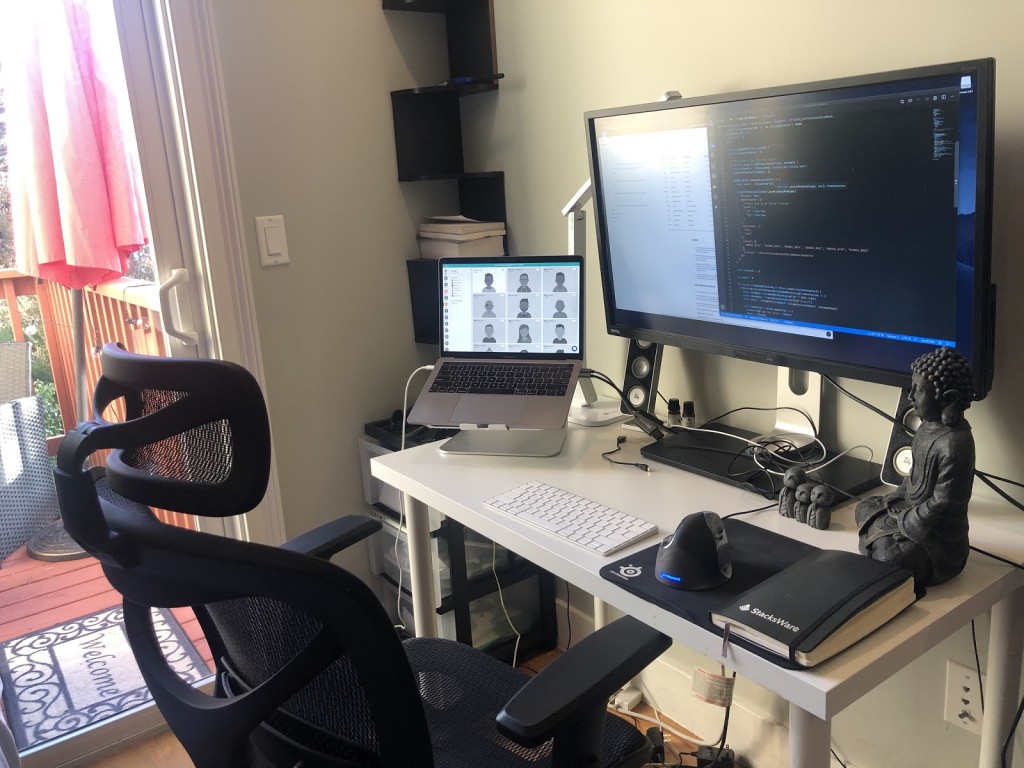
Interview with Vivek, an entrepreneur building a virtual office for remote teams
How did you get started with remote work?
I never really expected to work remotely, to be honest. Out of college, I founded a company called StacksWare after graduating from college and sold it after operating the business for two years. The acquiring company was based in Santa Clara at the time, and we were living in San Francisco.
The daily commute was brutal, taking one and a half hours to commute one way during peak traffic. I viscerally remember my lowest point during that period. I was sitting in my car in bumper-to-bumper traffic on the 101 on a Monday morning, calculating the opportunity cost of all the lost time in traffic and dreading the return journey at 6 PM.
I asked if I could work remotely and never looked back.
Read 114 answers from other remote workers
What are you working on?
After working at the acquiring company for a couple of years, I built a virtual office for remote teams called Pragli.
The product enables remote workers to frictionlessly dive into impromptu conversations with audio channels and direct conversations, similar to a walkie talkie.
Pragli also allows you to feel more present with your team by helping you craft a unique digital identity with live avatars.
Read 107 answers from other remote workers
What's your typical work routine?
- 7 AM - Wake up and get dressed
- 7 AM to 7:30 AM - Meditate for 30 minutes
- 7:30 AM to 7:40 AM - Treat my bonsai tree
- 7:40 AM to 8:30 AM - Answer emails and customer messages on Intercom
- 8:30 AM to 9:00 AM - Open Pragli and chat with my cofounder about the engineering or marketing tasks for the day. Leave Pragli open to have easier audio/video conversations if we need them.
- 9:00 AM to 11:30 AM - Take any meetings for the day with customers, vendors, or partners. I schedule most of my meetings during this block to free time in the afternoon for deep work. Calendly is critical for ensuring that I only schedule meetings during this block.
- 11:30 AM to 12:15 PM - Lunchtime
- 12:15 PM to 4 PM - Execution time to develop engineering features, squash bugs, or work on marketing material
- 4 PM to 4:30 PM - Break time
- 4:30 PM to 6:30 PM - Creative time to design new product features in Figma or send outreach emails
- 6:30 PM to 7:30 PM - Dinner time
Read 92 answers from other remote workers
Do you have a dedicated space to work?
I keep my workspace in my bedroom. The ambient light is excellent, and I can easily step outside to take a breather and meditate.
I use this hardware for my daily routine:
- VARIDESK – height adjustable standing desk converter
- BenQ 32" 4K monitor
- Apple Magic Keyboard
- Evoluent VM4R vertical mouse
- Rain Design mStand
Read 93 answers from other remote workers
How do you stay on task?
I have three strategies for eliminating distractions:
-
Silence all mobile and desktop notifications. - This is the lowest hanging fruit. You can't stay focused if your device is screaming for your attention every other minute.
-
Remove visual distractions - Visual distractions are often more nefarious than notifications. Even when I silence my notifications, I make sure that the windows on my screen are relevant for my deep work. If they aren't relevant, I close them. This also extends not only to the virtual world but also to the physical world. I used to have a workspace that faced the road, but even seeing my neighbors waving to each other could subtly throw off my focus.
-
Reduce distractions caused by anxiety - The hardest distractions to eliminate have been self-inflicted distractions caused by anxiety about events that have happened during the day. This is especially relevant for startup founders.
Chaos is normal during startup life. A new feature can introduce massive unintended bugs in the product. Or a potential customer might not understand the product's value prop during a demo. Or an existing customer may get frustrated that you haven't shipped a feature request yet.
It seems impossible not to obsess about the craziness of the day when you want to stay focused.
Meditation has been critical in combating this self-sabotage. I recommend that everyone experiment with different meditation techniques to find out what works for them.
But, I use the Headspace mobile app to reduce anxiety and stress and use techniques from Eknath Easwaran's book Conquest of Mind to improve my mental focus.
Read 100 answers from other remote workers
What do you like about remote work?
Flexibility of work time. - I love when employers measure productivity by work output rather than hours spent at a desk.
Office optics suck.
Flexibility of geography. I've lived in the Bay Area for almost a decade, and it's great. But, I want to experience living in other cities across the globe. Most importantly, though, I prefer my home office workspace to office environments with tons of ambient noise and interruptions.
No commuting. I suffer from chronic neck pain, and I can't bear commutes that last more than 30 minutes.
Read 106 answers from other remote workers
What do you not like about remote work?
Social isolation has been the most challenging aspect of remote work. As much as I hate the dynamics of office culture, working remotely made me realize how much I missed the passive social contact that you get in an office. Human contact is critical for work fulfillment.
I work around the isolation by using Pragli to stay present with my team and replicate the impromptu conversations that happen naturally in offices. But, developing relationships outside of virtual settings has been the most important for me to prevent loneliness.
Being diligent about scheduling time to hang out with friends 2 to 3 times throughout the week has been great for my mental health.
Read 103 answers from other remote workers
What tools do you use to stay productive?
RescueTime - a Desktop app that passively monitors the websites that you visit and gives analytics assessing how productive you've been for that week.
The first step to improving your productivity is acknowledging where you stand.
Be Focused - a Desktop app that sets alarms on a 30-minute cadence to remind you to take breaks. The app roughly follows the Pomodoro time management technique.
Asana - Project management website for organizing your tasks and tracking project completion
Pragli - (as described above) a Desktop app that provides a virtual office for your remote team. We use the product every day to facilitate quick audio/video communication and for team presence.
Calendly - Scheduling software that eliminates the painful back-and-forth of email scheduling. You just send a Calendly link to expose the times in your calendar that you're free. After using the product, I've reclaimed hours of time for coding and marketing.
Read 108 answers from other remote workers
Do you have any advice for remote workers?
View social isolation as a fun challenge, not an obstacle. Many people don't have strong physical social networks where they live, and that's totally fine!
Use the opportunity to find the intersection of your hobbies and a community, such as a recreational basketball league or church group that meets to play board games. Whatever you decide to do, make sure that you're consistent.
Also, not all remote positions are created equal.
Beware of situations where:
1) You would be the only remote worker, and 2) The hiring company is not promoting ways to support remote workers (i.e., not "remote-friendly"). You'll be fighting a losing battle in feeling productive and being included in the company discourse.
I've interviewed a few remote workers who are obviously worn down by communication dynamics that reward office workers and beat down remote workers by exclusion.
Great remote situations exist - you just have to go out there and find them.
Read 39 answers from other remote workers
What are the challenges of building a remote team?
Truthfully, it's much easier to build a culture in a physical office. Water cooler chats and bonding over lunch seem like inconsequential events, but they collectively build a strong sense of community that energizes a team.
But, that doesn't mean that you can't recreate those important bonding moments virtually. Managers have to be especially diligent about the tools and processes that they introduce to make sure that teammates feel like they have an outlet to bond.
Hosting office hours and happy hours virtually can be a great way to make people feel more connected.
Read 11 answers from other remote workers
What are the benefits of building a remote team?
Despite these challenges, the benefits of remote teams are too important to ignore.
- You can hire the best talent around the globe
- You can retain people longer by granting them the flexibility to live life without compromising their output
- You don't have to bankrupt your business by hiring workers in expensive metropolitan areas with equally expensive salaries (the going rate for a Facebook engineering manager in the Bay Area apparently exceeds $500K)
I believe that the future of work is remote, and so should you. If you have any questions about my responses, feel free to contact me at [email protected].
Read 12 answers from other remote workers
What did we forget to ask Vivek Nair?
At RemoteHabits we're always trying to improve our interviews, what question should we have asked Vivek Nair?
Biography
Vivek Nair
Vivek is an entrepreneur and software engineer building Pragli, a virtual office for remote teams. He previously sold another technology company StacksWare and graduated from Stanford University with a degree in computer science in 2015. Also, he's a big fan of PB&Js and the Lakers (often both at the same time).
Work remotely? Share your story on RemoteHabits!
Want to be interviewed? If you have a remote position, head over to the interview me page!
Looking for a remote job?
RemoteHabits Jobs has everything you need to find your next great remote work position!
Related Interviews
Interview with Erin, a videographer who found her freelancing niche
Erin is a videographer who carved out a successful freelancing niche—see how she optimizes her time and plans for the ups and downs of freelance work.
Interview with Lily, an entrepreneur building VR conferencing for remote teams
Lily has almost a decade of remote work experience, now she's building the team collaboration tool of the future with Virtual Reality
Interview with Mehmet, a nomadic digital maker and entrepreneur
Mehmet has embraced his remote team leadership style. Hear about his most helpful productivity trick and why he has "quiet" days for his staff.



